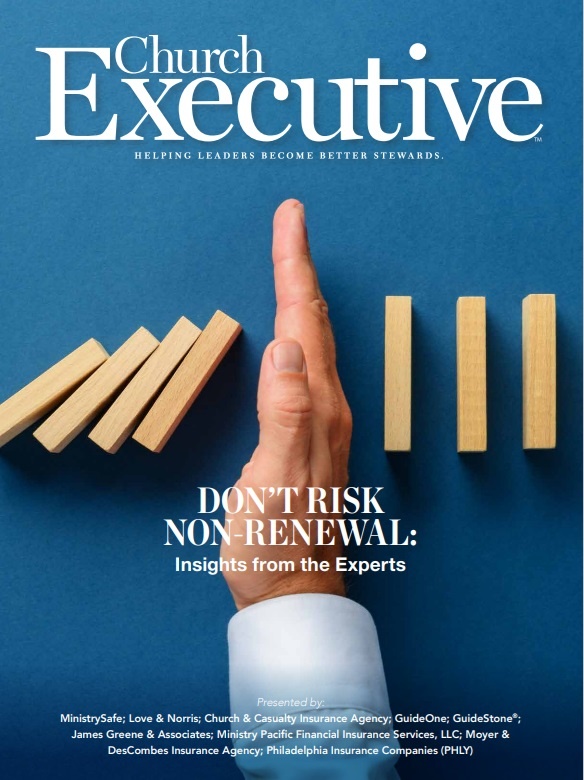 When considering what can be done to protect children from sexual abuse incidents, the answer is always: more.
When considering what can be done to protect children from sexual abuse incidents, the answer is always: more.
There are more resources available now than ever to help. Legislation, for sure, but also support from insurance carriers, including Philadelphia Insurance Companies, which offer resources at a discounted cost or even for free.
But these tools are only as effective as their implementation.

Vice President, Risk Management Services
Philadelphia Insurance Companies (PHLY)
In a climate where background checks are the bare minimum duty of care — and even those aren’t being performed by every single church that serves children — religious organizations desperately need to lean in. Until and unless they do, churches will continue to experience tighter amounts and availability of insurance coverage related to sexual abuse and misconduct. Both reflect society’s ever-growing awareness and intolerance for these events, as evidenced by skyrocketing settlement awards.
So, what can church leaders do? Plenty.
STRATEGY #1: Select the right broker and carrier partner
Knowledge and experience are key when vetting your insurance broker and carrier options. To gauge both, you need to ask some simple questions. For a church leader looking to determine if his or her insurance program is in the right place, two simple questions are helpful. For carriers: What other churches do you insure? For brokers: With which carriers have you been appointed to place business?
In the U.S., only a few carriers out of thousands are well-equipped to understand the distinct exposures of a church, and sexual abuse and molestation is only one of those; other aspects must also be understood and underwritten very well.
STRATEGY #2: Get ahead of the renewal process
Whether you are preparing to renew your coverage or just looking at how to improve your church’s current child sexual abuse prevention measures and policies, there are proactive steps that can be taken. The point is to have an active conversation versus waiting until the carrier needs an answer about your efforts in order to complete the renewal process. Have a conversation with your broker in advance of renewal and ask: What else can we be doing? What other resources are available to us? The right broker will have specific feedback and offer additional resources.
Thankfully, the vast majority of churches have not needed to deal with a sexual predator in their midst or the consequences of their deviant behavior. Even so, it should remain a top-of-mind threat for any congregation, period.
STRATEGY #3: Take a proactive approach with the church’s vested partners

Who are these partners? Your church’s commercial insurance carrier can be one. Does that carrier know who can be helpful in providing additional training, policies, procedure examples or additions? Your church’s broker is another vested partner. There might even be individuals within your own congregation (again, vested partners) who, given their professional expertise, would be excellent resources. Actively pursuing continuous improvement is becoming a minimum standard for insurers. Thankfully, the vast majority of churches have not needed to deal with a sexual predator in their midst or the consequences of their deviant behavior. Even so, it should remain a top-of-mind threat for any congregation, period.
STRATEGY #4: Church leaders must “walk the talk”
With their messaging and actions, the most senior leaders at your church must demonstrate a commitment to sexual abuse prevention policies and procedures. I’m talking about the senior pastor, the elders, and so on.
For example, if the church is considering developing a new ministry within its youth program, are sexual abuse prevention measures discussed? If so, were the senior leaders the ones to bring it up? Even in the course and scope of regular church business, at key leadership meetings throughout the year, is child sexual abuse prevention a bullet point? Is it a standing agenda item? Are senior church leaders, themselves, actively demonstrating a commitment to child sexual abuse prevention? Are they supporting the child checkout process with their own children? Actions are powerful; if senior leaders aren’t “walking the talk” — if they’re the exceptions — how can anyone else on the team be expected to follow these policies and procedures?
No one likes to talk about child sexual abuse; it’s an awful topic. But we have to get past this apprehension, particularly as church leaders, and keep this issue at the forefront.
Sexual predators are absolutely seeking organizations where the barriers to access are the lowest. For this reason alone, assessing and honing your prevention efforts isn’t just a “box to check” during the insurance renewal process; they must be ingrained into the day-to-day operations of the church and actively supported leadership.


